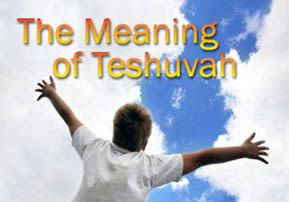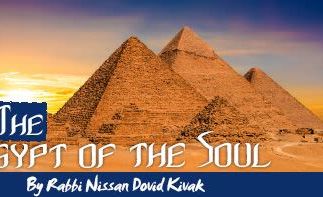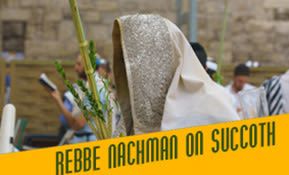
The Meaning of Teshuvah
For when we return to our true “place,” to the source of our being, we can fulfill our true potential – and fulfillment leads to a sense of rest...

A Return to the Source
“Teshuvah means returning a thing to the place from which it was taken. What is that place? It is Wisdom – for Wisdom is the source of all things, as the verse says, ‘You have made them all in wisdom” (Tehillim 104:24)” [Likutey Moharan I:35, 1].
Teshuvah means returning a thing to its source, which is the wisdom of God. The source of our souls is a spark of Divine wisdom, and that is the “place” to which we must return. Hence, when we make our minds a more faithful expression of Divine wisdom, we are involved in a process of teshuvah.
At the Center of Being – a Source of Rest
When we do teshuvah and return to the source of our being, we can truly feel “at rest.” We can live and work in the world with an inner sense of peace and repose. For when we return to our true “place,” to the source of our being, we can fulfill our true potential – and fulfillment leads to a sense of rest, wholeness, and completion.
We see this in connection with Baruch ben Neriyah who was a disciple of the prophet, Yirmiyahu (Jeremiah). He was also responsible for receiving the Torah from Yirmiyahu and for teaching it a generation later to Ezra the Scribe and his colleagues (See Rambam, Introduction to Mishnah Torah. See also Megillah 16b). In one of the prophecies of Yirmiyahu, it is mentioned that Baruch ben Neriyah complained, “I have not found rest” (Yirmiyahu 45:3), and the Targum translates this as “I have not attained prophecy.” But what is the connection between rest and prophecy?
Each individual soul is rooted in a specific level and aspect of Godliness. Hence the teshuvah of each individual, and the perfection he is capable of attaining, is unique. Baruch ben Neriyah knew that he had a very lofty soul, one that gave him the potential to attain prophecy. Hence when he saw that he had not become a prophet, he understood that he had not yet reached the root of his soul. Reaching the root of his soul would have given him a sense of repose and fulfillment, and so he described his lack of perfection by saying “I have not found rest” (See Yalkut Shimoni, Jeremiah 329).
In fact, his failure to attain prophecy was a result of the destruction of the First Temple, as the Gemara says: “From the day the Temple was destroyed, prophecy was taken away from the prophets…” (Bava Batra 12b). The Temple was the center of the world and the dwelling place of the Shechinah, and when the Shechinah was exiled from its true place, the prophets also experienced a kind of inner dislocation that prevented them from reaching the root of their soul and fulfilling their potential for prophecy. This connection between the Temple and prophecy is also alluded to by the Midrash when it says: “We can assume that any prophet whose city is not specifically mentioned came from Jerusalem” (Eicha Rabbotai, Pesicha 1:24).
In a Time of Distress – One Returns to the Source
When a soul, or any other created being, is united with its source, it is at rest; when it is separated from its source it is not at rest – it is restless. There is a kind of spiritual principle that when any creature is in a state of distress – the very opposite of rest – it will feel a powerful impulse to return to its source and to its place of rest.
Rabbi Tzaddok HaKohen of Lublin (The “Thirteen Principles of Rabbi Tzaddok HaKohen,” printed at the beginning of Ohr Zarua LaTzaddik) used this idea to explain a Mishna (Keilim 17:13) that deals with the ritual purity (taharah) and impurity (tumah) of vessels. The general rule is that a vessel made from the skin of a land animal can become ritually impure, while a vessel made from the skin of a sea creature, such as a fish, cannot. The seal, however, appears to be an exception to this rule. Although it spends most of its life in the ocean, it is considered to be a land animal, and hence a vessel made from sealskin is subject to ritual impurity. The Mishnah presents this halacha with an explanation: “All creatures that live in the sea are ritually pure, except for the seal, because it flees to the land (when it is frightened).”
In other words, according to the Mishnah, the place to which an animal flees is a better indication of its true nature than the place in which it spends most of its life. Why is that? Rabbi Tzaddok explained that this is based on the spiritual principle that when a creature is in distress, it will try to return to the source of its being. Since a seal flees to the land, we can conclude that its life and being are derived from the land. That is where it feels at rest, and that is its “true place”. In short, it is a land animal.
Teshuvah is also an expression of this “law of nature,” for when a soul is in distress and seeks to return to a state of peace, it is drawn back to its source in the wisdom of God.
Shabbat as the Source
Rebbe Nachman teaches that teshuvah depends on faith – for teshuvah is a return to God’s wisdom, and in order to receive that wisdom, we need faith. It is written, “As God spoke, by the hand of Moshe (Moses)” (Shemot 9:35), which suggests that Moshe’s hand was the “vessel” or the “tool” by which he was able to receive God’s speech and wisdom. “Moshe’s hand” refers to faith, Rebbe Nachman explains, as it is written: “And (Moshe’s) hands were steady (emunah)” (ibid. 17:12); the usual meaning of the word emunah is “faith”. In other words, just as our hands enable us to receive something, so does faith enable us to receive God’s wisdom (See Sichot Haran 98).
Even a person who has already attained a lofty comprehension of God’s wisdom still needs to strengthen his intellect by means of faith. Just as in secular studies, when even a genius must rest his mind from time to time in order to renew his intellectual powers, so too in the realm of holiness even a Tzaddik, who is constantly using his mind to understand God and His ways, must allow his mind to rest at times. And when his intellect is resting, the Tzaddik must serve God on the level of faith, without a clear comprehension of Divinity. Through this rest, he will renew his intellectual powers so that he can once again receive God’s wisdom.
For this reason, Rebbe Nachman describes faith as a kind of sleep, a life-giving rest for the mind that takes place at a time when intellectual illumination is lacking, as suggested by the verse: “…and Your faith in the nights” (Tehillim 92:3) (See Likutey Moharan I:35, 3-5). For a great Tzaddik who is always attached to God, this “rest” could be a time when he studies the Torah on the level of its simple, revealed meaning. For even the Gemara, with all its complexity and wisdom, seems a kind of “darkness” in comparison to the Tzaddik’s direct comprehension of Godliness. In reference to the verse, “You have placed me in the darkness” (Eicha 3:6) our Sages comment: “This is the Babylonian Talmud (Sanhedrin 24a). But when the Tzaddik studies the revealed aspects of the Torah in a manner of “darkness” and “rest”, he can strengthen his faith and restore the power of his intellect to comprehend Godliness. From this we see that the “place” to which Godly intellect must go in order to find rest and renewal is the simple meaning of the Torah, and the attribute of faith.
On Shabbat, we also find rest and renewal by means of faith. For Shabbat is the source of faith, and thus the source of all blessings. As Rebbe Nachman writes: “Shabbat is an expression of our faith in God’s unity and in His creation of the world. And faith is the source of all blessings, as the verse says, ‘A man of faith will have many blessings’ (Mishlei 28:20). Hence it is written, ‘God blessed the seventh day’ (Bereishit 2:3)”(Likutey Moharan I:31,2).
On Shabbat, because it is a day of rest and faith, we can receive much more of God’s wisdom than during the week. Wisdom is an aspect of the beginning, as it says, “The beginning is wisdom” (The simple meaning of this verse is, “The beginning of wisdom is the fear of God”). This alludes to the Sefirah of Chochmah (“Wisdom”), whereas faith is an expression of the last of the ten Sefirot, Malchut (“Kingdom”) (See Zohar 3:192). On Shabbat, wisdom is united with faith, in accordance with the Kabbalistic teaching that “the end is wedged within the beginning” (Sefer Yetzirah 1:7). Hence on Shabbat, the seventh day, the day of Malchut and faith, we make use of the “vessel” of faith to receive God’s wisdom.
Rebbe Nachman writes that the light of Shabbat brings us to a form of teshuvah (Likutey Moharan I:58). This is hinted to by the verse: “You shall return (veshavta) to the Lord, your God” (Devarim 30:2). Since the Torah is written without vowels, the word shavta can also be read as Shabbat. On Shabbat, our teshuvah is inspired by love (teshuvah mei’ahavah), for love can be awakened by delight, and on Shabbat we experience a delight in Godliness (oneg Shabbat). The light of Shabbat makes us feel a delight at being close to God, and a delight in serving God through Torah and prayer – this is teshuvah motivated by love. The light of Shabbat brings new life to our bodies and souls, for on Shabbat we bring the Divine wisdom into our lives, and “wisdom gives life to those who have it” (Kohelet 7:12).
The Shechinah in Exile
“This is the aspect of zarka – which means, according to the Zohar, that “She is thrown back to the place from where She was taken.” And what is that place? It is Wisdom” (Likutey Moharan I:35,1).
The Zohar discusses the mystical meaning of the ta’amim, the cantillation marks used in reading the Torah (see Likutey Moharan I:22,2 and I:91). The mark zarka takes its name from the verb lizrok, “to throw,” and hence the Zohar explains it to mean that the Shechinah, the Divine Presence, which is now in exile, will eventually be returned to “the place from where She was taken.” That place is God’s wisdom, which is the source of all things. When the Divine Presence will be restored to its place, God’s light will shine in all the worlds, from the highest to the lowest, including the physical world in which we live. This is described by the prophet in his vision of the Redemption: “And the earth shone with His glory” (Yechezkel 43:2).
The Shechinah corresponds to the Sefirah of Malchut, which is the lowest of the ten Sefirot. Malchut is the source of all the lower worlds, because God creates them with the revelation of His light as it is clothed within the Sefirah of Malchut. It is with the Sefirah of Malchut that God governs and directs all the worlds, and hence it is the attribute by which we can recognize the Creator as our King. The Divine Names Elo-him and Ado-nai are associated with the Sefirah of Malchut, for these Names express His absolute kingship and authority.
Malchut is the Sefirah that actualizes the creative potential of Chochmah, the divine wisdom, for it is through Malchut that the entire creation, from beginning to end with all its myriad details, is created and controlled in accordance with His wisdom.
When the Shechinah is in exile, however, it is difficult for us to recognize God as King of the universe. Instead of revealing God’s power and authority, the events of the world seem to indicate the opposite: the world seems to exist on its own, and the creatures of the world seem to act without any control from Above. We see a diversity of forces; God’s unity and power are not immediately apparent. Instead of bringing us closer to God, the world can generate questions and doubts in our minds. It was in reference to such a time that God said, “I will drape the heavens in darkness, and I will cover them with sackcloth” (Yeshayahu 50:3). For when the Shechinah is in exile, the light of heaven is obscured and it is difficult to see God’s guiding Hand in the world.
At the same time, when Malchut is separated from the Divine wisdom, the world becomes filled with a type of secular, human wisdom that seeks to disconnect the events of the world from the kingship of God. This is the most difficult exile of all.
To be continued…
(Excerpt from The Scent of Gan Eden, by Rabbi Yaakov Meir Shechter, Keren Ohr Publications. Used with author’s permission.)












Tell us what you think!
Thank you for your comment!
It will be published after approval by the Editor.